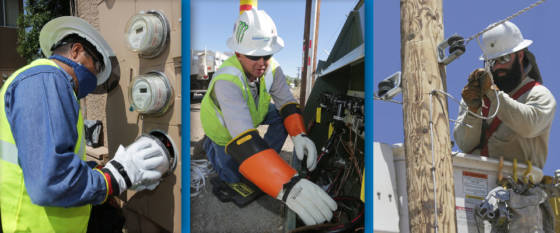
Protect Yourself from Scams
Scammers who want to steal your money can strike at any time.
Year-round, UniSource customers report suspicious phone calls, text messages, letters and even visits from scammers who impersonate UniSource employees while using high-pressure tactics.
Here are some of the digital ways scammers may contact you:
- Sponsored ads on search engines that lead to an identical, but fake, utility bill payment page.
- QR codes that scammers link to a false utility payment page.
- Texts from a scammer claiming to be a utility representative, with a link to an impostor website.
Common signs of a scam:
- Threat to disconnect. Scammers often contact customers claiming their utility bill is past due and service will be shut off unless payment is made right away.
- Demand for immediate payment. Scammers often pressure customers to make payments immediately or face disconnection.
- Request for a prepaid card. Con artists often instruct victims to purchase a prepaid card such as Green Dot, MoneyPak or Vanilla at a nearby store, and then call them back. The scammer then asks for the card and PIN number, which grants instant access to the card’s funds. In just a few seconds, the victim’s money is gone.
Protect Yourself
UniSource never uses high-pressure tactics to collect payment. Here are several steps you can take to avoid being duped by scammers.
- Hang up. If you suspect you are the target of a phone scam, just hang up. Don’t feel pressured to provide personal information or take any action. Similarly, you can delete suspicious emails or shut the door on suspicious visitors. If you’re concerned for your physical safety, call 911. UniSource only contacts customers by phone with automated bill payment reminders as a courtesy, and never demands immediate payment.
- Don’t fall for threats. Slow down. Scammers typically try to rush customers by threatening immediate utility shut-off. Customers with delinquent accounts receive multiple notifications well in advance – never a single notice one hour or less before disconnection.
- Don’t follow scammers’ instructions to buy prepaid cards. UniSource never urges customers to purchase pre-paid money cards to pay a monthly bill. Scammers will ask for the prepaid card’s receipt number and PIN number, which grants instant access to the card’s funds. UniSource does not accept any cryptocurrency as payments, including bitcoin. A complete list of legitimate payment methods, including payment online and through UniSource's mobile app, is available by clicking here.
- Contact UniSource. If you have questions about your bill or concerns about these issues, please call UniSource's Customer Care team at 1-877-837-4968 – the number listed on your monthly bill and here, on uesaz.com. Don’t call other phone numbers provided by scammers. Customers also can log in or use UniSource's mobile app to check account status.
Beware of the Scam
Many customers have reported being contacted by someone pretending to work for UniSource who threatened to disconnect their service due to unpaid bills or damaged meters. Customers were urged to make payment over the phone with a pre-paid money card within a short amount of time – usually an hour or less – to avoid shutoff.
These scammers may use an angry or urgent tone of voice to pressure you into making a payment. Scammers also might entice their intended victims by offering a month of free electric service or bill discounts. In some cases, they instruct customers to bring a money order or cashier’s check to a local pharmacy or to pay in bitcoin. Some scammers will contact customers via text message, registered letter or in person. They sometimes use software that disguises phone calls or text messages to appear as if they’re coming from UniSource.
Such scams have become commonplace despite active prevention efforts by law enforcement, government agencies and companies such as UniSource whose customers are being targeted.
Learn More
Scammers have targeted utility customers across North America, prompting UniSource and other utilities in Arizona to participate in a consumer awareness campaign.
Customers who receive phone calls or text messages like these also are encouraged to contact the Arizona Attorney General’s office at (800) 352-8431 or to file a consumer complaint at azag.gov. The Attorney General’s office seeks to protect the public and can take legal action in situations that involve violations of state and federal consumer protection laws.
These long-running scams can take many forms. Scammers have claimed to work for the Arizona Corporation Commission (ACC) and tried to convince customers to buy into a home repair grant scheme. Similarly, law enforcement and other local agencies have reported that phone scammers have impersonated government employees throughout Arizona including the Arizona Attorney General’s office and the Internal Revenue Service.


